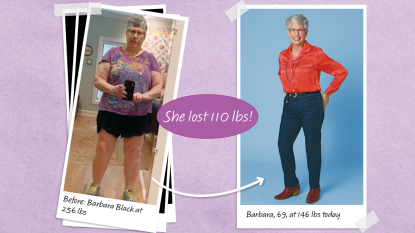5 Surprising Ways COVID-19 Can Age Your Body

COVID-19 has impacted all of us in different ways. One of the less talked about effects is premature aging, which can be caused by chronic stress, a sedentary lifestyle, and loneliness — three conditions amplified by the pandemic. Heightened anxiety due to fear of COVID-19 exposure, reduced activity following time stuck at home, and greater isolation because of less frequent social gatherings have put our bodies on high alert. But it’s not just these circumstances that are harmful — contracting COVID-19 can also accelerate aging in startling ways.
Brain shrinkage and memory loss are two of several post-COVID side effects that are negatively impacting people of all ages. Below are symptoms and side effects to be aware of and look out for after recovering from the disease.
Brain Shrinkage
We’re not going to beat around the bush — one of the most dramatic aging effects COVID-19 can have on the human body is brain shrinkage. According to a study published in Nature this March, even a mild case of COVID can cause a loss of brain matter that’s equivalent to a full decade of aging. Normally, people lose about 0.2 to 0.3 percent of their brain matter each year; however, this study found that COVID patients experienced an additional loss of anywhere between 0.2 to 2 percent of their brain size in the three years between MRI scans (researchers compared two MRI scans of each subject’s brain, taken three years apart, with the first scan conducted pre-pandemic). Only 15 of the 401 volunteers who tested positive for COVID needed to be hospitalized due to the virus — meaning that even mild cases led to noticeable loss (10 years’ worth!) of brain matter.
Loss of Smell and Taste
Some loss of taste and smell is natural with aging, especially after 60. We’re born with 10,000 taste buds, a number that begins to gradually decline at age 50, and as many as seven out of 10 older adults experience an impaired sense of smell. One of COVID-19’s tell-tale symptoms is a similar sensory impairment.
While 90 percent of those affected by this symptom improve within four weeks, some experience a permanent loss. One 2021 study found that 700,000 to 1.6 million people in the United States who got COVID-19 may have lost their sense of smell for six months or more. A longer-term loss of taste can render foods bland, salty, sweet, or metallic when they shouldn’t be, and anosmia, a loss of smell — or parosmia, a distorted sense of smell — can be particularly dangerous to post-COVID patients, as they reduce the ability to detect scents like spoiled food and harmful smoke.
Joint Pain and Stiffness
We all know joints grow stiffer and bones more brittle with age. Starting around 30, you begin to lose bone density and muscle mass, which can contribute to strain and pain in your joints; arthritis typically strikes between age 40 and 60. Unfortunately, it seems COVID infections may lead to similarly debilitating joint pain. A study carried out at Northwestern University and published in Skeletal Radiology in 2021 found that COVID can trigger the body to attack itself in ways that could lead to rheumatological issues. Another study conducted by researchers in Harbin and Beijing this May surveyed 1,296 COVID-19 survivors one year after they were released from the hospital and found that over 12 percent still reported rheumatic symptoms. The most common symptoms involved joints in the knee (38 percent), hand (25 percent), and shoulder (19 percent) — plus, being older and female were two clear risk factors.
Memory and Attention Loss
As the years pass, you may notice it takes you longer to learn new things or that it’s harder to remember information. You might misplace items like your glasses more easily. Some older adults develop mild cognitive impairment (MCI), in which memory or other cerebral challenges occur, which can be an early sign of Alzheimer’s disease. Alzheimer’s is the most common form of dementia in people over age 65, and it includes the loss of cognitive functioning such as thinking, remembering, and learning.
There’s growing evidence that COVID can cause lasting cognitive and mental health problems too, with recovered patients reporting symptoms including “brain fog” (slow or sluggish thinking) and problems with recalling words months after infection. Studies report brain fog issues both in people who were hospitalized with COVID and those who were not. A January study published by a researchers based in Germany suggests that even patients who don’t notice signs of their own cognitive impairment can have problems with memory and attention after recovering from a mild case of COVID-19.
Temporary Hair Loss
Nearly everyone’s locks become less luscious over time. The rate of hair growth slows with age, and strands become smaller and have less pigment. A whopping 55 percent of women experience some hair loss by the age of 70. But a COVID infection can cause hair loss as well, a phenomenon known as telogen effluvium. When a person experiences an event like a viral infection, hospitalization, or even significant emotional stress, their body can prematurely shift a greater than normal proportion of growing anagen hairs into a resting telogen state.
The good news? The majority of these cases clear up in three to six months. Telogen effluvium does not cause a person to lose their hair follicles, though hair may not temporarily grow. However, in less than 10 percent of cases, patients can develop chronic telogen effluvium, where excessive hair shedding persists beyond six months.
The simplest way to evade these symptoms is to avoid catching COVID in the first place. To improve your chances of doing so, scientists recommend wearing a mask in public places. Hopefully, this guide helps you to identify and address possible post-COVID side effects if you do get infected — and as always, if you believe you’re experiencing these symptoms, consult with your doctor!













